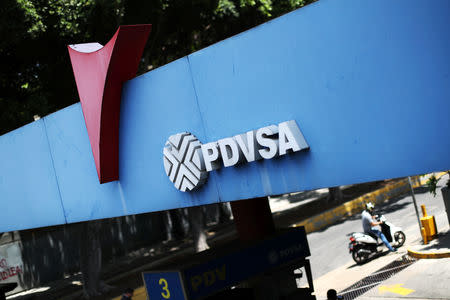Exclusive: Operator of Venezuelan PDVSA's fleet seeks to detain tankers: document, sources
By Marianna Parraga, Florence Tan and Mircely Guanipa
(Reuters) - German shipping firm Bernhard Schulte Shipmanagement (BSM) has moved to legally detain three of Venezuelan PDVSA's oil tankers to collect on late payments owed to it by the state-run oil company, according to a document seen by Reuters and sources close to the decision.
PDVSA has struggled for years to pay its bills due to falling crude output and limited cash flow, leaving it owing numerous firms worldwide. That was even before the United States in late January imposed tough sanctions on Venezuela's oil exports, which have since dropped by more than 40 percent.
BSM operated 13 of the 32 tankers owned by PDVSA and two Very Large Crude Carriers (VLCCs) jointly owned by PDVSA and PetroChina, according to the companies. In March, BSM started withdrawing staff from PDVSA's tankers to reduce its exposure to Venezuela and later returned some of them to the firm.
Hamburg-based BSM is now looking to arrest - the legal term for preventing a ship from moving, but short of an outright seizure - the three tankers in question over debt accumulated by PDVSA.
"Due to the substantial fees due to BSM from owners we have placed arrest on three of the tankers, the Arita in Singapore and the Parnaso and Rio Arauca which are both in Lisbon, Portugal," said a letter distributed internally by BSM this month.
PDVSA crude and fuel exports have dropped to around 800,000 barrels per day (bpd) so far in May, down from 1.4 million bpd just before sanctions, according to PDVSA's trade documents and Refinitiv Eikon data.
BSM is not the only maritime firm taking action against PDVSA. U.S.-based shipbroker McQuilling Partners in March ended a contract for providing four tankers to PDVSA, citing sanctions.
The two maritime services firms handled a large portion of vessels leased and owned by PDVSA. Without them, Venezuela is limited in its ability to store oil, move cargoes between ports internally, and even export to certain destinations.
On April 6, the Arita, owned by PDVSA's subsidiary Albanave and operated by a unit of BSM, was detained in Singapore by law firm Gurbani & Co on behalf of BSM, according to the country's Supreme Court website and a source familiar with the matter.
BSM's attempt to arrest the Parnaso and the Rio Arauca in Portugal has been more complicated. Those two vessels have been moored in that country's waters since 2017 due to disputes with shipping firms and fuel providers in Portugal, along with Lisbon's Port Authority.
BSM, Lisbon Port Authority and PDVSA's maritime unit PDV Marina declined to comment. PDVSA did not respond to a request for comment. In March, it said its relationship with BSM had not ended.
The amount owed by PDV Marina to BSM globally at the end of 2018 was at least $15 million, according to a source at the company and another document seen by Reuters early this year.
The Arita, an Aframax vessel that can hold up to 700,000 barrels of oil, has not navigated much since it first set sail at the end of 2017, as it was hampered by a dispute between PDVSA and Iranian shipyard Sadra that kept it from being used. Following a few trips to China and Indonesia in 2018, it has remained in Singapore since April with its engine "immobilized," according to Refinitiv Eikon tanker tracking data.
FEW OPTIONS FOR PDVSA
BSM has returned four vessels to PDVSA and plans to return another nine by the end of June, but the process "has proven to be challenging and time consuming," the company said in the internal letter. The two VLCCs jointly owned by PDVSA and PetroChina have not been included in the plans.
PDVSA has struggled to hire maritime services due to sanctions and mounting bills. It has started talks with a Venezuela-based firm, Blue Oceanic Services CA, for placing crew and supplying food and provisions to some tankers, the same source added.
Blue Oceanic Services did not respond to requests for comment.
In recent weeks PDVSA has asked some tankers to switch off transponders while in Venezuelan or Cuban waters, which could be to avoid detection due to U.S. sanctions on Venezuelan shipments, according to captains, inspectors and shipping sources. It has also sought to beef up security by putting military officers on certain vessels, the company said.
(Reporting by Marianna Parraga in Mexico City; Florence Tan in Singapore and Mircely Guanipa in Punto Fijo, Venezuela. Additional reporting by Catarina Demony in Lisbon and Luc Cohen in Caracas; Editing by Marguerita Choy)


